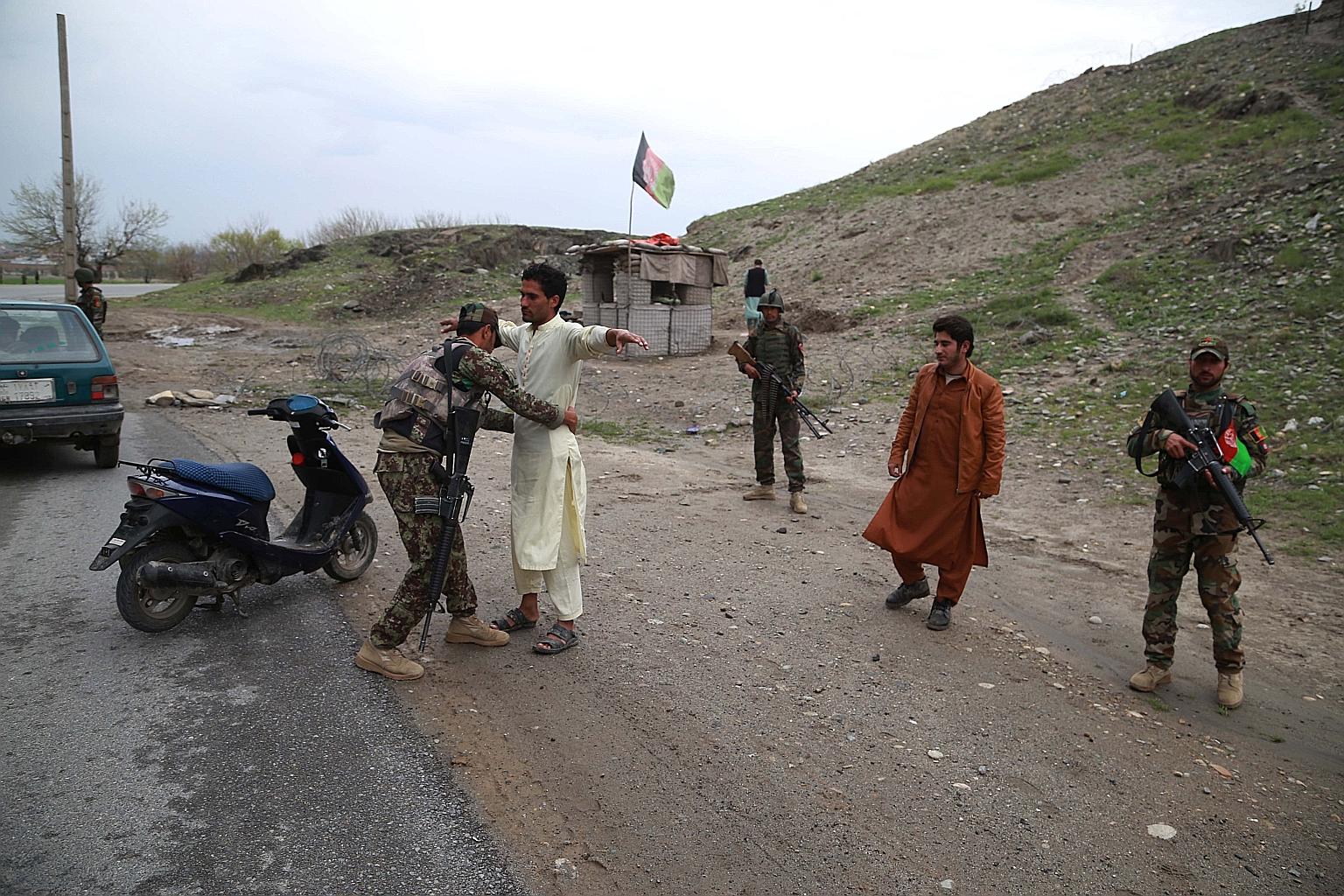Probe into Afghan war abuses 'must go ahead'
Hague court upholds prosecution's appeal, including investigating possible US atrocities
Sign up now: Get insights on Asia's fast-moving developments

Security officials conducting a body search at a checkpoint in Nangarhar province, Afghanistan, on Wednesday. The International Criminal Court's ruling comes days after the Taleban killed at least 20 Afghan soldiers and policemen in overnight attacks, throwing the country's nascent peace process into grave doubt.
PHOTO: EPA-EFE
Follow topic:
THE HAGUE • International war crimes judges yesterday ruled that a probe into wartime abuses in Afghanistan must go ahead, including looking into possible atrocities committed by US forces, as they overturned a previous court ruling.
The Hague-based International Criminal Court's (ICC) ruling comes days after Taleban militants killed at least 20 Afghan soldiers and policemen in a string of overnight attacks, throwing the country's nascent peace process into grave doubt.
The US on Wednesday also carried out its first air strike on Taleban fighters in Afghanistan since the two sides signed a troop withdrawal agreement last Saturday.
A US forces spokesman confirmed the latest incident in southern Helmand province, hours after President Donald Trump spoke by phone with chief Taleban negotiator Mullah Baradar Akhund on Tuesday, the first known conversation between a US leader and a top Taleban official.
The Taleban fighters "were actively attacking an (Afghan National Security Forces) checkpoint", Colonel Sonny Leggett, a spokesman for US Forces, Afghanistan, said in a tweet. "This was a defensive strike to disrupt the attack."
Under the terms of the recent US-Taleban agreement, foreign forces will quit Afghanistan within 14 months, subject to Taleban security guarantees and a pledge by the insurgents to hold talks with Kabul.
A US-led force invaded Afghanistan in 2001 following the Sept 11 terror attacks in the United States, targeting Al-Qaeda in sanctuaries provided by the Taleban government.
Fighting has continued since - last year more than 3,400 civilians were killed and almost 7,000 injured, according to data provided by United Nations agencies.
Pre-trial judges at the ICC last year rejected a demand by its chief prosecutor to open a full-blown probe into crimes committed in Afghanistan - an investigation also bitterly opposed by Washington.
Prosecutors appealed against the move, saying the judges made an error when they slapped down prosecutor Fatou Bensouda's request and said that although it met all the right criteria and had a reasonable basis, it was "not in the interest of justice".
The appeals judges agreed with the prosecution.
"The prosecutor is authorised to commence an investigation into alleged crimes committed on the territory of Afghanistan since May 1, 2003," said ICC judge Piotr Hofmanski.
"It is for the prosecutor to determine whether there is a reasonable basis to initiate an investigation" under the court's statutes, he said.
In 2006, the ICC's prosecutors opened a preliminary probe into possible war crimes and crimes against humanity in the central Asian nation since 2003.
In 2017, Ms Bensouda asked judges to allow a full-blown inquiry, not only into Taleban and Afghan government personnel, but also international forces, US troops and members of the Central Intelligence Agency.
However, pre-trial judges then said it "would not serve the interests of justice" and that the court should focus on cases with a better chance of success.
Yesterday, human rights groups hailed the decision to uphold the prosecution's appeal.
"The decision also sends a much-needed signal to current and would-be perpetrators of atrocities that justice may one day catch up to them," said Ms Param-Preet Singh of Human Rights Watch.
The US has never joined the ICC. Washington argues that it has its own procedures in place to deal with US troops who engage in misconduct.
Afghanistan also opposed the inquiry, saying the country itself had "responsibility to bring justice for our nation and for our people".
A dispute over prisoner release also threatens the US-led peace effort. Afghan President Ashraf Ghani - whose government is not a party to the US-Taleban pact - opposed the release of up to 5,000 Taleban prisoners in exchange for up to 1,000 Afghan government captives by next Tuesday.
AGENCE FRANCE-PRESSE, REUTERS

